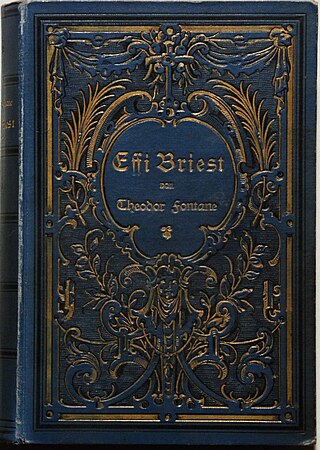
Effi Briest is a realist novel by Theodor Fontane. Published in book form in 1895, Effi Briest marks both a watershed and a climax in the poetic realism of literature. It can be thematically compared to other novels on 19th-century marriage from a female perspective, such as Anna Karenina and Madame Bovary, which are also adultery tragedies.
Jackboot Mutiny is a 1955 West German film directed by Georg Wilhelm Pabst about the 20 July Plot to assassinate Adolf Hitler. It features Bernhard Wicki as Stauffenberg.

Der Kommissar is a German television series about a group of detectives of the Munich homicide squad (Mordkommission). All 97 episodes, which were shot in black-and-white and first broadcast between 1969 and 1976, were written by Herbert Reinecker and starred Erik Ode as Kommissar Herbert Keller. Keller's assistants were Walter Grabert, Robert Heines, and Harry Klein who, in 1974, was replaced by his younger brother Erwin Klein.

Bernhard Wicki was an Austrian-Swiss actor, film director and screenwriter. He was a key figure in the revitalization of post-war German-language cinema, particularly in West Germany, and also directed several Hollywood films.
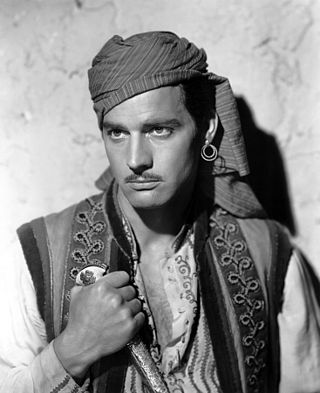
Paul Hubschmid was a Swiss actor. He was most notable for his role as Henry Higgins in a production of My Fair Lady. In some of his Hollywood films he used the name Paul Christian. He appeared in dozens of films and television series between 1938 and 1991. Many of these were German and International productions.

Die Brücke is a 1959 West German anti-war film directed by Austrian filmmaker Bernhard Wicki. It is based on the 1958 novel of the same name by journalist and writer Gregor Dorfmeister. The story was based on an actual event, upon the personal report of a surviving veteran who in his own youth experienced a similar situation in World War II.
This is a list of the winners of the Bavarian Film Awards Prize Honorary award.

Ruth Leuwerik was a German film actress, one of the most popular stars of German film during the 1950s. She appeared in 34 films between 1950 and 1977. Leuwerik is probably best known for her portrayal of Maria von Trapp in the films The Trapp Family and The Trapp Family in America.
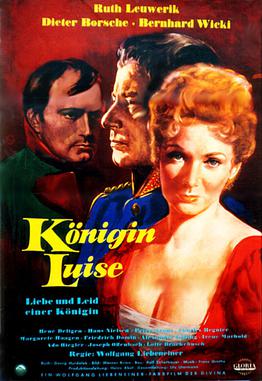
Queen Louise is a 1957 West German historical drama film directed by Wolfgang Liebeneiner and starring Ruth Leuwerik, Dieter Borsche and Bernhard Wicki. It was made at the Emelka Studios in Munich, with sets designed by the art director Rolf Zehetbauer. It was one of a number of films made during the 1950s that portrayed historical royal Germany in a positive manner. It is similar in theme to the Prussian film genre which had been popular between the two World Wars including two previous films about Louise Queen Louise (1927) and Louise, Queen of Prussia (1931).

Sweetheart of the Gods is a 1960 West German biographical film directed by Gottfried Reinhardt and starring Ruth Leuwerik, Peter van Eyck, and Harry Meyen. The film portrays the life of Renate Müller, a German film actress who died in 1937 in mysterious circumstances. A variety of rumours about Müller's death had developed, but the filmmakers chose to portray it as suicide following Nazi pressure over her relationship with a Jewish diplomat. Following legal objections from Müller's family, the ending was toned down to make her final fate more vague.

The Zürich Engagement is a 1957 West German comedy film directed by Helmut Käutner and starring Liselotte Pulver, Paul Hubschmid, and Bernhard Wicki.It is also known by the alternative title The Affairs of Julie.

Circus of Love is a 1954 drama film directed by Kurt Neumann and starring Eva Bartok, Curd Jürgens and Bernhard Wicki. It was made as a co-production between West Germany and the United States. It premiered at the Berlin International Film Festival.
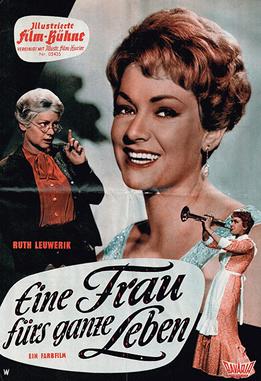
A Woman for Life is a 1960 West German musical comedy film directed by Wolfgang Liebeneiner and starring Ruth Leuwerik, Klausjürgen Wussow, and Harry Meyen.
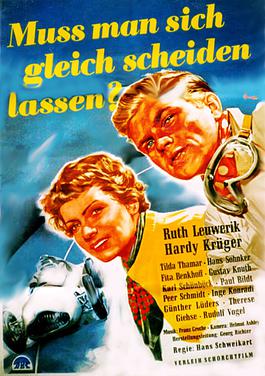
Must We Get Divorced? is a 1953 West German comedy film directed by Hans Schweikart and starring Hardy Krüger, Ruth Leuwerik and Tilda Thamar. It was made at the Bavaria Studios in Munich. The film's sets were designed by the art director Fritz Lück and Hans Sohnle. Location filming took place in Lucerne and at the Nürburgring.

The Golden Bridge is a 1956 West German drama film directed by Paul Verhoeven and starring Ruth Leuwerik, Curd Jürgens and Paul Hubschmid. It was shot at the Bavaria Studios in Munich. The film's sets were designed by the art director Max Mellin.
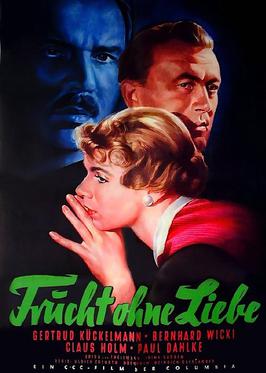
Fruit Without Love is a 1956 West German romantic drama film directed by Ulrich Erfurth and starring Gertrud Kückelmann, Bernhard Wicki and Claus Holm. It was made at the Spandau Studios in West Berlin. The film's sets were designed by the art director Rolf Zehetbauer.

Prisoners of Love is a 1954 West German drama film directed by Rudolf Jugert and starring Curd Jürgens, Annemarie Düringer and Bernhard Wicki. It revolves around the story of a married couple separated by the Second World War. It was shot at the Bavaria Studios in Munich. The film's sets were designed by the art director Erich Kettelhut and Johannes Ott.

Roses in Autumn is a 1955 West German historical drama film directed by Rudolf Jugert and starring Ruth Leuwerik, Bernhard Wicki, Carl Raddatz and Lil Dagover. It is based on the 1894 novel Effi Briest by Theodor Fontane. It was shot in Eastmancolor at the Bavaria Studios in Munich. The film's sets were designed by the art director Walter Haag and Hans Kutzner. Location shooting took place around Göttingen in Lower Saxony and the island of Sylt in Schleswig-Holstein.
















